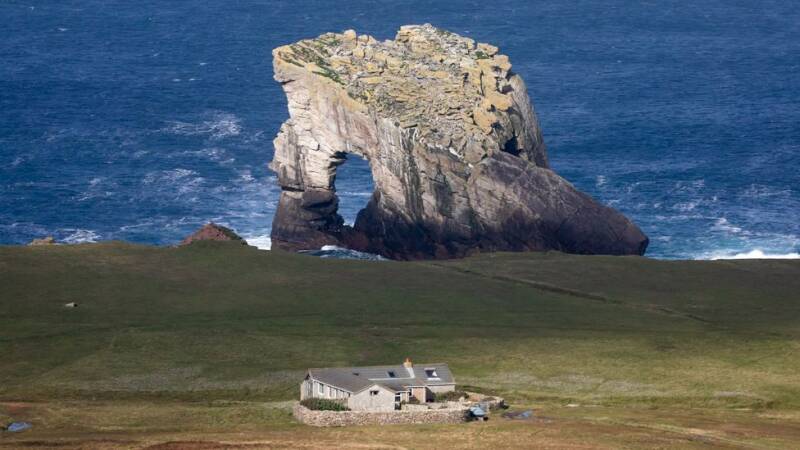


### Discovering Foula: Britain's Most Remote Inhabited Island
Nestled in the Shetland archipelago, Foula is a hidden gem that offers a glimpse into a world untouched by modern hustle and bustle. Known as Britain's most remote inhabited island, Foula is a place where time seems to stand still, and nature reigns supreme.
#### A Journey to the Edge of the World
Located 28 kilometers west of the Shetland Mainland, Foula is accessible only by a 17-minute flight from Tingwall Airport or a two-hour ferry ride from Walls. The island's rugged beauty is characterized by its dramatic cliffs, which rise up to 418 meters at The Sneug, making it one of the highest sea cliffs in Britain.
#### A Rich Tapestry of History and Culture
Foula's history is as fascinating as its landscape. The island has evidence of settlement dating back to the Iron and Bronze Ages, and Norsemen settled here around 800 AD. The island's name, derived from the Old Norse "Fugley," meaning "bird island," reflects its abundant birdlife. Foula was one of the last places in Shetland where the old Norn language was spoken, adding to its unique cultural heritage.
#### Life on Foula
With a population of just 30 people, Foula is a tight-knit community where everyone knows each other. Islanders make a living from sheep farming and birdwatching tourism. The island is home to thousands of birds, including puffins, guillemots, and kittiwakes, making it a paradise for birdwatchers. The island's tranquility and natural beauty offer a perfect escape from the chaos of modern life.
#### Celebrating Christmas on Foula
Christmas on Foula is a uniquely charming experience that reflects the island's tight-knit community and rich traditions. The festive season is a time for togetherness, warmth, and celebrating the spirit of the season.
1. **Community Gatherings**: The islanders gather together for communal meals and celebrations, sharing traditional Shetland dishes and enjoying each other's company. Given the small population, these gatherings are intimate and heartfelt, fostering a strong sense of belonging.
2. **Traditional Music and Dance**: Music and dance play a significant role in Foula's Christmas celebrations. Islanders often come together to play traditional Shetland tunes on fiddles and accordions, with impromptu dances breaking out in living rooms and community halls.
3. **Decorations and Crafts**: Despite its remote location, Foula embraces the festive spirit with handmade decorations and crafts. Islanders create wreaths, ornaments, and other decorations using natural materials found on the island, adding a rustic and personal touch to the festivities.
4. **Lighting the Dark Nights**: With long winter nights, lighting becomes an essential part of the Christmas celebrations. Islanders decorate their homes with candles and lanterns, creating a warm and inviting atmosphere that contrasts beautifully with the dark, wintery landscape.
5. **Shetland Traditions**: Foula's Christmas celebrations also incorporate broader Shetland traditions, such as the "Yule Log," a large log brought into the home and burned in the hearth throughout the festive season, symbolizing warmth and light.
In observance of the old Julian calendar and the old ways of Yule.they celebrate christmas on the 6th of January.
Until around 20 years ago, a hunt for the cormorant seabird was another tradition that marked the day.
According to accounts, Pope Gregory XIII took issue with the old Julian calendar in 1582. On assuming that each year contained 365-and-a-quarter days, an error had been allowed to build up over time with each year accumulating an extra 11 minutes. As a result, the calendar was becoming badly out of sync with the seasons.
Britain, reluctant to conform to European ways, did not adopt the Gregorian calendar until 1752, when 11 days had to be deleted. There was pubic outcry amid the refrain “give us back out 11 days!”
Foula kept its dates after 1752 with the island now one day ahead of the Julian calendar and 12 days behind the Gregorian. While Christmas is celebrated on January 6, New Year is marked on January 13.
#### Challenges and Rewards
Living on Foula comes with its challenges, especially due to its remote location. The island is often cut off from the mainland during the winter months due to strong equinoctial gales. However, the islanders are well-prepared and have adapted to the harsh conditions. The sense of community and resilience is palpable, making Foula a place of both challenges and rewards.
#### A Call to Adventure
For those seeking an adventure off the beaten path, Foula is a destination worth exploring. Whether you're drawn by its rich history, stunning landscapes, or the chance to witness its unique way of life, Foula offers an experience like no other. Just remember to pack everything you need, as there are no shops or Wi-Fi on the island.


Add comment
Comments